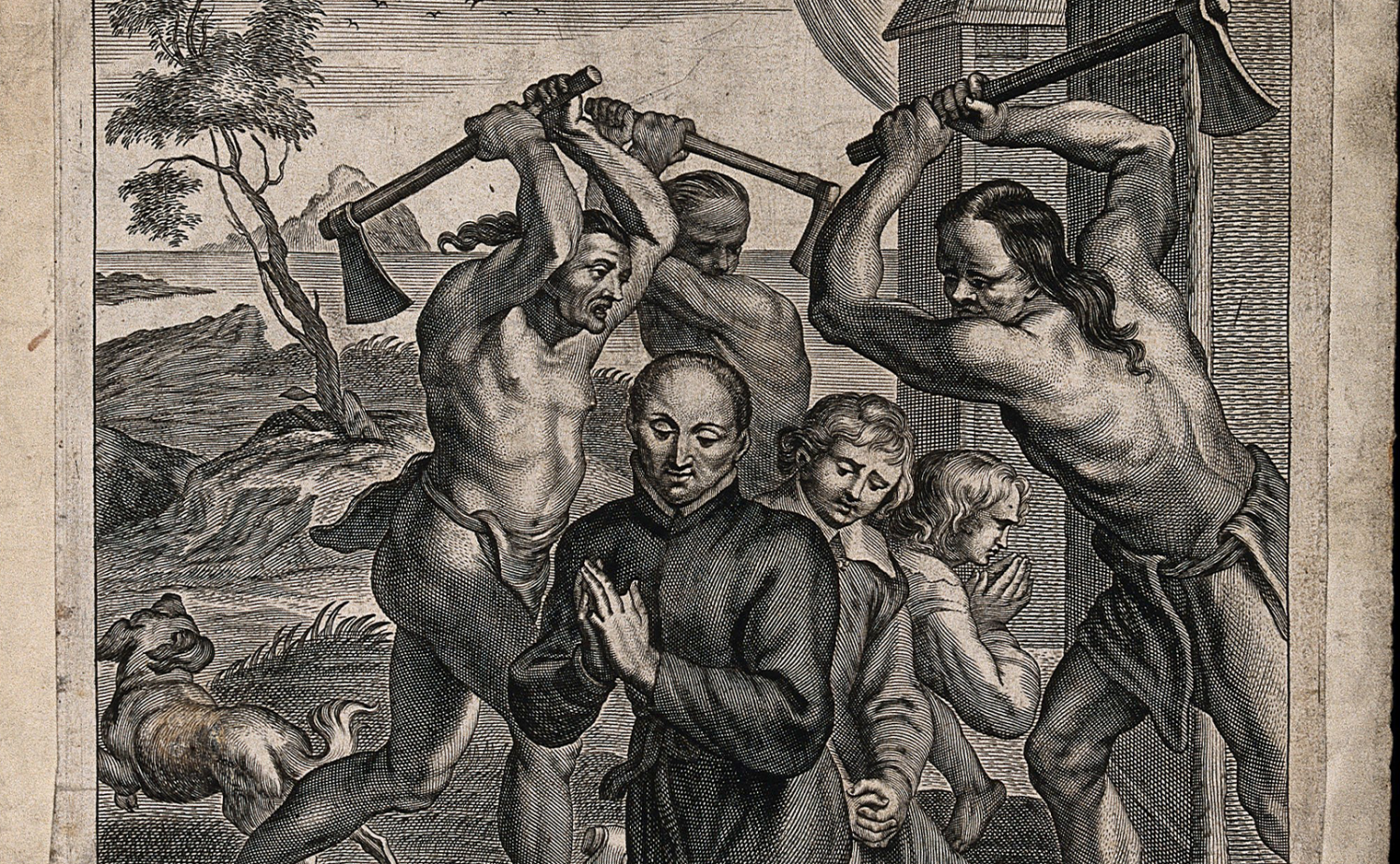 |
| Fr. Isaac Jogues worked among the Hurons. He and St. Jean de Brebeuf were captured in an Iriquois raid and martyred. Fr. Jean was brutally tortured. |
But it's his recent article at Catholic World Report on the Amazon synod that caught my eye. After referencing the story about the mission that celebrates not baptizing a single soul in over 50 years, he talks about missionary martyrs of the past. St. Francis Xavier, St. Isaac Jogues, St. Jean de Brebeuf... they all devoted themselves to bringing the good news to those living (literally) in physical and spiritual darkness. When one compares those Jesuits' zeal and willingness to give their lives for the ransom of many, one can only mourn at the collapse of faith among some modern so-called missionaries.
Fr. Corrado Dalmolego, the Italian priest who keeps a tight cap on baptismal waters in the Amazon, wants his version of missionary-as-social-worker to guide the upcoming synod. It is a shocking vision for a Catholic priest who's lived among the Yanomami for eleven years:
Infanticide is one of the most deeply rooted “traditions” among the Yanomami. It is carried out by the mother, who moves away to give birth and either welcomes her newborn or kills him by burying him alive. Infanticide is practiced to eliminate children born with defects, or as a form of sex selection (males prefer women and to have a male as their first born child; if twins are born, only one is allowed to live, and if the two are males, they kill the weaker one), orsimply to avoid having to take care of both simultaneously (they breastfeed for three years on average).[3]...
One of the most primitive customs of this ethnic group is the practice of ritual cannibalism: in a collective and sacred ritual funeral, they incinerate the corpse of a dead relative and eat the ashes of their bones, mixing them with “pijiguao” paste (made with the fruit of a kind of palm tree), because they believe that the deceased’s vital energy lies in his bones and is thus reintegrated into the family group. A Yanomami who kills an adversary in enemy territory also practices this form of cannibalism to purify himself.[6]Fr. Corrado describes the "spiritual enrichment" of the people:
 |
| Fr. Corrado, the icon for the new missionary who baptizes no one and respects the "spiritual enrichment" they offer. Does that include cannibalism and infanticide, Father? |
[They] “tend to put things together,” that is, they invoke the God of the whites without giving up their own beliefs. “It is not necessary to give up but simply to appropriate something else. Why should you not do this exercise, have those experiences also as a Church?” the Consolata missionary asks. “On the one hand, this can be branded as syncretism, relativism,” he concedes. But he concludes by saying that, at any rate, “We do not own the truth.”
As a result of this new conception of the Church’s evangelizing action as a mere exercise in inter-religious dialogue, Fr. Corrado Dalmonego brags about an astonishing fact to which his interviewer refers and which any traditional missionary would consider a most bitter failure: he has directed “a mission of presence and dialogue” in which “after sixty years, no one has been baptized”![7]
Even more seriously, Fr. Dalmonego states that “all those he knows who have worked there admire this way and have participated and dedicated their lives, years and work, they value this way of action which [he] would not reduce to a silent testimony because when you talk you speak, when you talk you announce.” But he insists on excluding any idea of “proselytism” and says that one should “not confuse announcement with what is considered conversion.”Wow! No conversion, no baptism, and let's imitate the natives because "we do not own the truth." So much for Jesus calling Himself the way, THE TRUTH, and the life! And Fr. Corrado's... what shall I call it? His..philosophy?...is the model for the Amazon synod whose architects have incorporated it into the Instrumentum Laboris. It does not auger well for the outcome. Garbage in...garbage out!
What would St. Isaac Jogues and St. Jean de Brebeuf think of this? Jogues worked among the Hurons and had to escape back to France at one point. Several of his fingers had been chewed off by the
The Right to Kill
Should Brazil keep its Amazon tribes from taking the lives of their children?
I welcome Fr. McTeigue's article, a breath of fresh air dispersing, even a little, the foul swamp gas emanating from pre-synod rot. I urge you to read Fr. McTeigue's article and the quotes from the heroic missionaries of the past. Here's just one from St. Isaac Jogues to whet your appetite:
My heart tells me that if I have the happiness of being employed in this mission, Ibo et non redibo (I shall go and not return); but I shall be happy if our Lord will complete the sacrifice where He has begun it, and make the little blood I have shed in that land the earnest of what I would give from every vein of my body and heart.Oh, and Fr. Jogues companion, Fr. Jean de Brebeuf, a giant bear of a man, was tortured over several days, slowly burned, had his skin cut off, was "baptized' with boiling water -- all while he was still alive. Then they cut out his heart and ate it in hopes of ingesting some of his great courage. But these missionary priests loved the natives so much they died like the early Christian martyrs... rejoicing to shed their blood in the service of God to bring souls to Christ. Do you think Fr. Dalmonego would do the same?

No comments:
Post a Comment